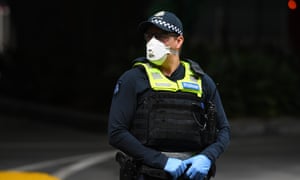Concern that police crackdown to tackle public health emergency will disproportionately affect vulnerable people
Eating a kebab on a bench, washing car windscreens at an intersection
or sitting in a stationary car – these are just some of the reasons
more than 50 people have been fined by police in New South Wales and Victoria for violating new coronavirus laws.
Sweeping new laws introduced to slow the number of people infected with the virus have reshaped Australian society in the past fortnight, imposing an unprecedented crackdown on public movement and curtailing civil liberties.
But while governments and police agencies say the laws are necessary given the public health emergency caused by the coronavirus, justice advocates warn the laws could have damaging consequences for traditionally over-policed communities.
Thanks to a string of public health orders issued by health ministers
across Australia, police in most states now have the power to fine or
arrest people caught gathering in groups of more than two or for being
outside of their homes without a “reasonable excuse”.Sweeping new laws introduced to slow the number of people infected with the virus have reshaped Australian society in the past fortnight, imposing an unprecedented crackdown on public movement and curtailing civil liberties.
But while governments and police agencies say the laws are necessary given the public health emergency caused by the coronavirus, justice advocates warn the laws could have damaging consequences for traditionally over-policed communities.
Breaching the orders is punishable in NSW by fines for individuals of up to $11,000 or six months in prison, or both, and in Victoria by fines of up to $19,800 through courts and $1,652 on the spot.
The bulk of the punishments have been issued in NSW and Victoria, where more than 50 fines have been handed out. Since 17 March two people in NSW have also been handed court attendance notices.
On Wednesday alone police in NSW fined 13 people for breaching the orders. In some cases, fines came after repeated warnings or while in the process of committing other crimes.
One 21-year-old man was fined $1,000 when he was spotted eating a kebab on a bench in Newcastle after ignoring two warnings by police earlier in the day.
In Albury a 51-year-old man was fined after he was involved in a minor car accident and allegedly told police he had left his home in order to visit his drug dealer. He was later found to have a disqualified driving licence.
But in other cases people were simply deemed to be outside without an excuse.
A 32-year-old woman and a 27-year-old man from Muswellbrook in the state’s Hunter Valley were fined for sitting in their car without “a reasonable excuse not to be at home”. A 34-year-old woman who was stopped at a roadside breath test in Moree was fined for the same reason.
On Thursday the NSW police commissioner Mick Fuller said the rules were necessary to “save lives”.
“The important thing is that people comply with the two-person rule when doing exercise, or that they only exercise with their household,” he said.
“As I keep saying, a good rule of thumb is that if you are questioning whether you should be doing something, it is best to give it a miss.”
But justice advocates say this sort of broad discretion attached to harsh fines and possible jail times could have dire consequences for the people who come into contact with police the most.
Police accountability solicitor from the Redern Legal Centre in Sydney, Samantha Lee, said police should be “provided with clear and rigorous guidance as to the application of these laws, and directed to issue a warning and a fine should be an absolute last resort”.
“This is one of the largest on-the-spot fines available to police, and one of the most complex pieces of public health legislation,” Lee said.
“Keeping the community safe is vitally important, but we are concerned these fines will disproportionately affect people already experiencing vulnerability, including young people, Aboriginal and Torres Strait Islander people and those who have just lost their job.”
She said the fact the fines were not means-tested and could be applied to children as young as 10 meant they would have greater impact on those with lesser means to pay them.
“The impact of fines often propels already marginalised people straight into the criminal justice system, simply because they are unable to pay,” she said.
Similarly Jonathon Hunyor, the chief executive of the Public Interest Advocacy Centre in Sydney, said he was concerned about the potential for the laws to be used against vulnerable communities such as the homeless.
While orders restricting public movement contain an exemption for homelessness, gatherings do not, something that could have negative consequences for people sleeping rough.
“Often homeless people will sleep near others because of the availability of shelter or safety and what we’re concerned about is if it is used in a way that effectively criminalises rough sleepers trying to stay safe,” he said.
“There’s a protocol for homelessness in public spaces that police are signed on to and a fundamental principle of that is don’t bother people minding their own business. We want to make sure that holds because those interactions are what lead to other offences like offensive behaviour or language.”
Other states have not disclosed how many fines they have issued. South Australia and Tasmania did not respond to questions from Guardian Australia, while Queensland police would not say how many people have been fined under public health orders.

However it appears the state may have applied leniency to many instances amid “confusion” about some of the new regulations.
In a statement released on Wednesday night, police said they would need to seek clarity about some elements of the state regulations.
“I understand there is confusion around what people can and can’t do and we will aim to clarify directions as they come into force,” deputy commissioner Steve Gollschewski said.
“Blatant disregard of the directions such as house parties will be enforced. Police will use discretion in other instances acting on intelligence or reported complaints.”

No comments:
Post a Comment